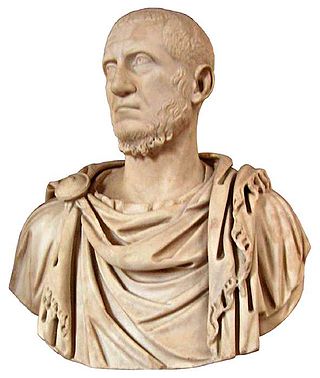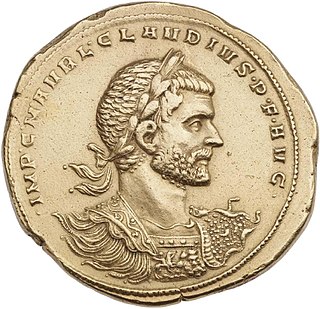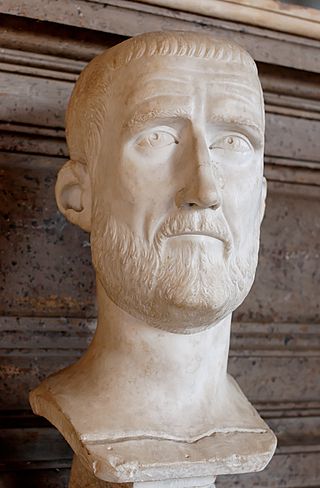Related Research Articles

Marcus Claudius Tacitus was Roman emperor from 275 to 276. During his short reign he campaigned against the Goths and the Heruli, for which he received the title Gothicus Maximus.

Marcus Aurelius Claudius "Gothicus", also known as Claudius II, was Roman emperor from 268 to 270. During his reign he fought successfully against the Alemanni and decisively defeated the Goths at the Battle of Naissus. He died after succumbing to a "pestilence", possibly the Plague of Cyprian that had ravaged the provinces of the Empire.

Marcus Aurelius Probus was Roman emperor from 276 to 282. Probus was an active and successful general as well as a conscientious administrator, and in his reign of six years he secured prosperity for the inner provinces while withstanding repeated invasions of barbarian tribes on almost every sector of the frontier.

Marcus Aurelius Marius was emperor of the Gallic Empire in 269 following the assassination of Postumus.

Marcus Clodius Pupienus Maximus was Roman emperor with Balbinus for 99 days in 238, during the Year of the Six Emperors. The sources for this period are scant, and thus knowledge of the emperor is limited. In most contemporary texts he is referred to by his cognomen "Maximus" rather than by his second nomen Pupienus.

The Historia Augusta is a late Roman collection of biographies, written in Latin, of the Roman emperors, their junior colleagues, designated heirs and usurpers from 117 to 284. Supposedly modeled on the similar work of Suetonius, The Twelve Caesars, it presents itself as a compilation of works by six different authors, collectively known as the Scriptores Historiae Augustae, written during the reigns of Diocletian and Constantine I and addressed to those emperors or other important personages in Ancient Rome. The collection, as extant, comprises thirty biographies, most of which contain the life of a single emperor, but some include a group of two or more, grouped together merely because these emperors were either similar or contemporaneous.

Marcus Piavonius Victorinus was emperor in the Gallic provinces from 268 to 270 or 269 to 271, following the brief reign of Marius. He was murdered by a jealous husband whose wife he had tried to seduce.

Gaius Pius Esuvius Tetricus was a Gallo-Roman nobleman who ruled as emperor of the Gallic Empire from 271 to 274 AD. He was originally the praeses of Gallia Aquitania and became emperor after the murder of Emperor Victorinus in 271, with the support of Victorinus's mother, Victoria. During his reign, he faced external pressure from Germanic raiders, who pillaged the eastern and northern parts of his empire, and the Roman Empire, from which the Gallic Empire had seceded. He also faced increasing internal pressure, which led him to declare his son, Tetricus II, caesar in 273 and possibly co-emperor in 274, although this is debated. The Roman emperor Aurelian invaded in 273 or 274, leading to the Battle of Châlons, at which Tetricus surrendered. Whether this capitulation was the result of a secret agreement between Tetricus and Aurelian or that surrender was necessary after his defeat is debated. Aurelian spared Tetricus, and made him a senator and the corrector (governor) of Lucania et Bruttium. Tetricus died of natural causes a few years after 274.

Titus Fulvius Junius Quietus was a Roman usurper against Roman Emperor Gallienus.
Licinius Valerianus Minor was the son of Roman emperor Valerian and his second wife Cornelia Gallonia, and half-brother of Gallienus.
The gens Ceionia or gens Caeionia or the Caeionii family was an ancient Roman senatorial family of imperial times. The first member of the gens to obtain the consulship was Lucius Ceionius Commodus in AD 78. The rise of this family culminated in the elevation of the emperor Lucius Verus, born Lucius Ceionius Commodus, in AD 161.
Virius Lupus was a consul of the Roman Empire in 278.
Aurelius/Iulius Marcellinus was a Roman soldier and Imperial functionary who had a brilliant equestrian career and was elevated to the Senate when he was chosen by the Emperor Aurelian as his consular colleague. His appointment as Consul is thought to have been a reward for his loyalty and steadfastness in 273 when, as Aurelian's deputy in charge of the eastern provinces of the Empire where the authority of the Imperial Government had only recently been restored, he resisted attempts to suborn him by a rebellious faction in the city of Palmyra.
Gaius Junius Donatus was a Roman politician, who was appointed consul twice, the second time in AD 260, during the Crisis of the Third Century.
Publius Cornelius Saecularis was a Roman politician who was appointed consul twice, first in around AD 240 and later in AD 260, during the Crisis of the Third Century.
Cassius Dio was a Roman senator who was appointed consul in AD 291.
Junius Tiberianus was a Roman senator who was appointed consul in AD 281.
Afranius Hannibalianus was the consul of 292 AD, a praetorian prefect, a senator and a military officer and commander.
Titus Flavius Postumius Varus was a Roman senator who was appointed suffect consul around AD 250.
(Titus Flavius) Postumius Quietus was a Roman senator who was appointed consul in AD 272.